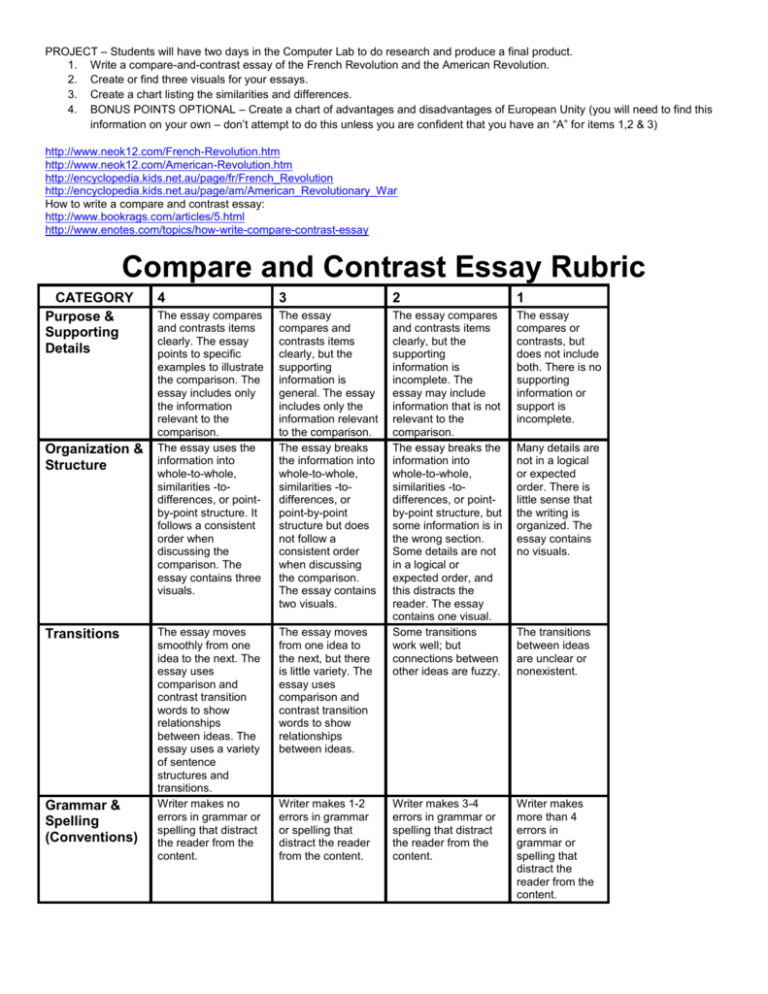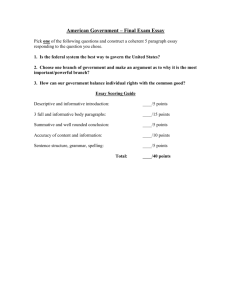Compare and Contrast Essay Rubric
advertisement

PROJECT – Students will have two days in the Computer Lab to do research and produce a final product. 1. Write a compare-and-contrast essay of the French Revolution and the American Revolution. 2. Create or find three visuals for your essays. 3. Create a chart listing the similarities and differences. 4. BONUS POINTS OPTIONAL – Create a chart of advantages and disadvantages of European Unity (you will need to find this information on your own – don’t attempt to do this unless you are confident that you have an “A” for items 1,2 & 3) http://www.neok12.com/French-Revolution.htm http://www.neok12.com/American-Revolution.htm http://encyclopedia.kids.net.au/page/fr/French_Revolution http://encyclopedia.kids.net.au/page/am/American_Revolutionary_War How to write a compare and contrast essay: http://www.bookrags.com/articles/5.html http://www.enotes.com/topics/how-write-compare-contrast-essay Compare and Contrast Essay Rubric CATEGORY Purpose & Supporting Details Organization & Structure Transitions Grammar & Spelling (Conventions) 4 3 2 1 The essay compares and contrasts items clearly. The essay points to specific examples to illustrate the comparison. The essay includes only the information relevant to the comparison. The essay uses the information into whole-to-whole, similarities -todifferences, or pointby-point structure. It follows a consistent order when discussing the comparison. The essay contains three visuals. The essay compares and contrasts items clearly, but the supporting information is general. The essay includes only the information relevant to the comparison. The essay breaks the information into whole-to-whole, similarities -todifferences, or point-by-point structure but does not follow a consistent order when discussing the comparison. The essay contains two visuals. The essay compares or contrasts, but does not include both. There is no supporting information or support is incomplete. The essay moves smoothly from one idea to the next. The essay uses comparison and contrast transition words to show relationships between ideas. The essay uses a variety of sentence structures and transitions. Writer makes no errors in grammar or spelling that distract the reader from the content. The essay moves from one idea to the next, but there is little variety. The essay uses comparison and contrast transition words to show relationships between ideas. The essay compares and contrasts items clearly, but the supporting information is incomplete. The essay may include information that is not relevant to the comparison. The essay breaks the information into whole-to-whole, similarities -todifferences, or pointby-point structure, but some information is in the wrong section. Some details are not in a logical or expected order, and this distracts the reader. The essay contains one visual. Some transitions work well; but connections between other ideas are fuzzy. Writer makes 3-4 errors in grammar or spelling that distract the reader from the content. Writer makes more than 4 errors in grammar or spelling that distract the reader from the content. Writer makes 1-2 errors in grammar or spelling that distract the reader from the content. Many details are not in a logical or expected order. There is little sense that the writing is organized. The essay contains no visuals. The transitions between ideas are unclear or nonexistent.








